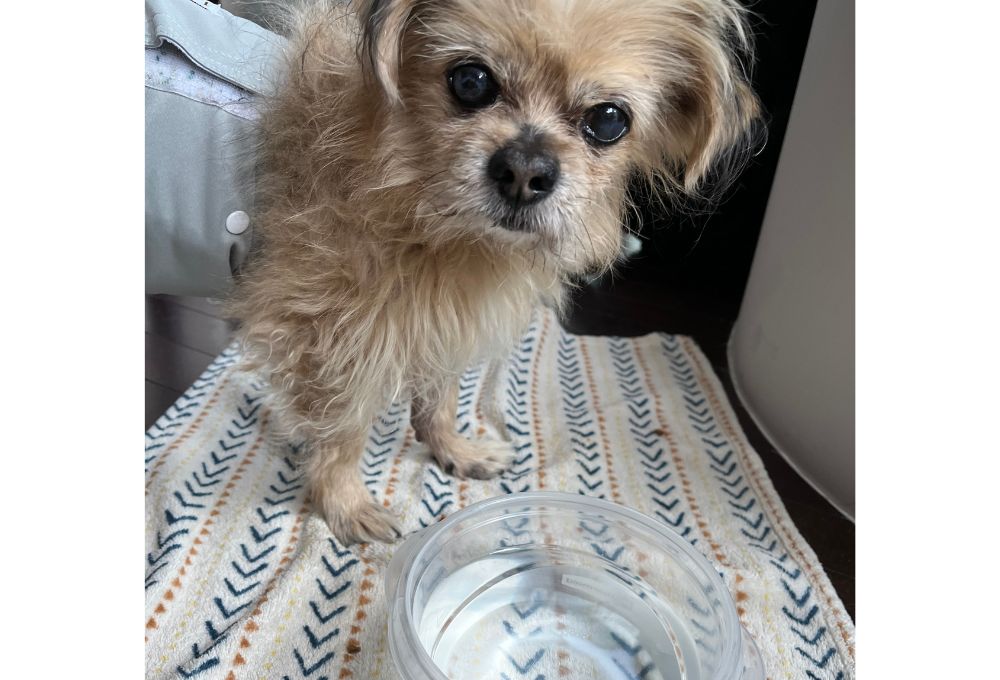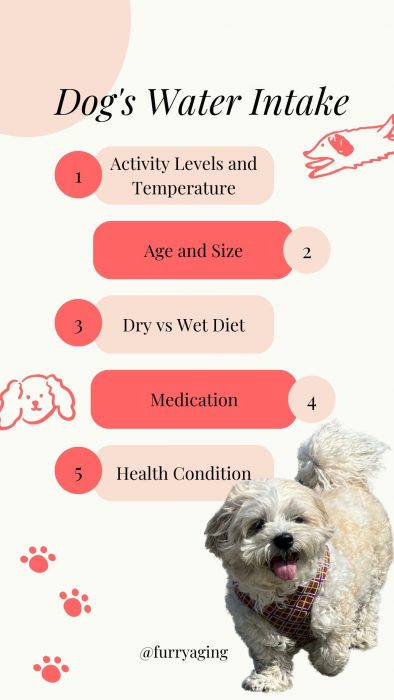
One common concern among pet owners is when their senior dogs begin drinking excessive amounts of water. While it can be alarming, this behavior may have various underlying causes. In this article, we will explore the reasons behind why senior dogs drink more water and what you can do to ensure their well-being.
What is the Normal Water Intake in Senior Dogs?
Drinking an adequate amount of water is essential for maintaining proper hydration, facilitating digestion, regulating body temperature, and supporting organ function. While needs may vary, a general guideline is for dogs to drink approximately 1 ounce of water per pound of body weight each day, meaning a 16-pound dog will need 16 ounces or 2 cups of water. However, this is just an average estimate, there are other factors that influence water intake such as activity level, weather, size, age, diet, and overall health can influence water intake.

It’s important to establish a baseline for your senior dog’s typical water intake by observing their drinking habits over a few days. This way, you can better identify any significant deviations from their normal pattern. If you notice a sudden and substantial increase or decrease in their water consumption, it’s recommended to consult with your veterinarian to rule out any underlying health concerns.
Common Causes of Excessive Drinking in Senior Dogs
Senior dogs tend to drink more water due to several factors. It is crucial to understand the significance of this behavior to ensure your dog’s well-being.
Dehydration
Dehydration is a common cause of increased water intake in senior dogs. As dogs age, their bodies may not retain water as efficiently as before. This can lead to dehydration, prompting them to drink more water to compensate for the loss.
Treatment: Ensure that fresh, clean water is readily available to your senior dog at all times. Encourage regular water intake and monitor their hydration levels closely. If you suspect dehydration, your veterinarian may recommend administering subcutaneous fluids or adjusting the dog’s diet to include moisture-rich foods.
Kidney Disease
Kidney disease is prevalent in senior dogs and can contribute to excessive thirst. When the kidneys fail to function properly, they are unable to concentrate urine effectively. As a result, more water is needed to eliminate waste from the body, leading to increased drinking. Other signs that may indicate kidney failure can include weight loss, nausea, vomiting, pale gums, loss of balance, and significant loss of appetite.
Treatment: If kidney disease is detected, treatment options may include dietary changes, medications to manage blood pressure and maintain kidney function, and fluid therapy to support hydration. Your veterinarian will develop a treatment plan based on the specific needs of your senior dog.
Diabetes
Diabetes, both type 1 and type 2, can cause excessive thirst in dogs. With diabetes, the body cannot regulate blood sugar levels correctly. Increased water consumption helps to flush out excess sugar through urine.
Treatment: If diabetes is diagnosed, treatment may involve dietary management, insulin therapy, regular monitoring of blood glucose levels, exercise, and lifestyle modifications to support weight management.
Cushing’s Disease
Cushing’s disease, or hyperadrenocorticism, is another condition that can cause a senior dog to drink more water. This disease occurs when the adrenal glands produce excessive cortisol and increased water intake helps the body flush out the excess cortisol. Other signs include increased urination, increased appetite, reduced activity, excessive panting, hair loss, and skin infections.
Treatment: For this condition, treatment options may include medication to regulate hormone levels, dietary modifications, and regular monitoring.
Medications
Certain medications prescribed to senior dogs can cause increased thirst as a side effect. It’s essential to consult with your veterinarian about any medications your dog is taking and discuss potential side effects. They may adjust the dosage or switch to alternative medications with fewer side effects.
Cognitive Dysfunction
Senior dogs can develop cognitive dysfunction, similar to Alzheimer’s disease in humans. This condition may cause changes in behavior such as increased water intake.
Treatment: While there is no cure for cognitive dysfunction in dogs, various treatment approaches can help manage the condition and slow its progression. These may include specialized diets, supplements rich in antioxidants and fatty acids, environmental enrichment, and medications that can improve cognitive function.
When to Seek Veterinary Assistance
Your vet will perform necessary tests and examinations to determine the cause and provide appropriate treatment. Here’s what you can expect during your visit:
- The veterinarian will start by discussing your senior dog’s medical history, including any existing conditions, medications, and recent changes in behavior or water intake.
- A thorough physical examination will be conducted to assess your dog’s overall health. The veterinarian will check vital signs, examine the body, and listen to the heart and lungs.
- Depending on the specific situation, the veterinarian may recommend diagnostic tests to identify the underlying cause of increased water intake. These tests may include blood work, urinalysis, imaging (such as X-rays or ultrasound), and hormone level evaluations.
- Once the diagnostic tests are complete, the veterinarian will discuss the findings with you and provide a treatment plan based on the identified cause. Treatment options may include medication, dietary changes, lifestyle modifications, or further investigations if needed.
- Your veterinarian may advise regular monitoring of your senior dog’s water intake, behavior, and overall well-being. This will help track the progress of the treatment plan and ensure that your furry companion is responding positively.
Tips to Manage Increased Water Intake in Senior Dogs
Diet and Hydration
Ensure your senior dog is on a well-balanced diet that meets their nutritional needs. Incorporating moisture-rich food, such as wet dog food or adding water to kibble, can help increase hydration.
Creating a Hydration Routine
Establish a consistent hydration routine for your senior dog. Provide fresh water in easily accessible locations throughout the day. Monitor their water intake to ensure they are drinking enough but not excessively.
Providing a Comfortable Environment
Make sure your senior dog has easy access to water and a comfortable resting area. Older dogs may have mobility issues, so it’s important to place water bowls in areas that are easily reachable for them.
Regular Exercise and Mental Stimulation
Engage your senior dog in regular exercise appropriate for their age and physical condition. Exercise helps maintain their overall health and can regulate water intake. Mental stimulation through puzzles and interactive toys can also keep them engaged and satisfied.
Monitoring and Observing Your Senior Dog
Keep a close eye on your senior dog’s behavior, including water intake, urination patterns, and overall well-being. Any significant changes should be noted and discussed with your veterinarian.
Conclusion
If you find your senior dog drinking more water than usual, it’s crucial to understand the potential causes and take appropriate measures. While increased water intake is common in aging dogs, excessive drinking can indicate an underlying health issue. By staying vigilant, providing a balanced diet, creating a hydration routine, and seeking veterinary assistance when necessary, you can ensure your senior dog’s well-being and quality of life.
FAQs
Yes, certain medications can lead to increased thirst as a side effect. Consult with your veterinarian about potential medication-related effects.
Not necessarily. While it can indicate an underlying health issue, senior dogs may naturally increase their water intake. However, significant changes should be monitored and discussed with a veterinarian.
Ensure fresh water is readily available, consider incorporating moisture-rich food, and consult with your veterinarian for guidance on increasing hydration.
Yes, a decrease in water intake can be a cause for concern. It may indicate dehydration or an underlying health issue. Contact your veterinarian for guidance.
Yes, cognitive dysfunction can cause changes in behavior, including drinking patterns. It’s important to observe any significant changes and discuss them with your veterinarian.
Recent Posts:
- What Your Dog’s Poop Reveals (Healthy Poops and Warning Signs)
- AI in Pet Care: 6 Innovative Applications
- FitBark 2 Review: The Lightest Pet’s Fitness Tracker
- What’s Happening in High-Tech Pet Care?
- Whistle Switch Smart Collar Review: Wins at Health and Fitness Tracking
Recent Posts
What Your Dog's Poop Reveals (Healthy Poops and Warning Signs)
An unusual poop could be concerning but does not necessarily mean our dog is in danger or sick. Especially, if they are otherwise behaving normally and not showing any signs of pain. I still...
I recently learned that AI can predict kidney diseases in pets that will occur two years from now with high accuracy, and this got me thinking if it could have changed my dog's fate. Could we have...
